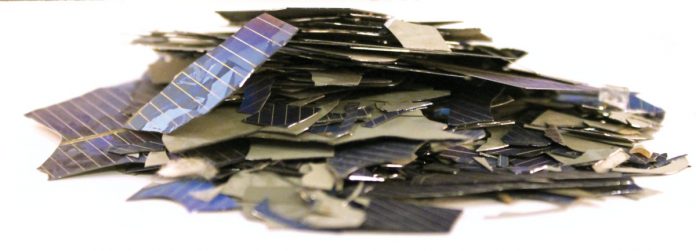When the Italian Carabinieri seized a waste treatment plant near Catania in Sicily a month ago, the Ministry of Environment alleged PV panels sent there for end-of-life recycling were being smuggled on for resale in African and Middle Eastern markets.
The Italian government alleged panels were being illegally re-labeled and sold in Senegal, Burkina Faso, Nigeria, Morocco, Mauritania, Turkey and even Syria.
News website UmbriaOn, meanwhile, has reported seven people were arrested by the Perugia office of the Italian Anti-Mafia Investigation Directorate (DDA) in a related investigation under ‘operation Black Sun’.
The website said the DDA had conducted an inspection at a waste treatment plant owned by the Raeegest company in Gualdo Tadino, in the central Italian province of Perugia, and that 12 assets belonging to companies connected to the matter were seized in Perugia, Bari, Bologna, Monza, Padova, Parma, Reggio Emilia, Roma, Siracusa, Treviso and Verona.
Where does responsibility lie?
According to the UmbriaOn article, 38 unnamed companies are under investigation for potentially having administrative responsibility for the alleged illegal recycling scheme. “In addition to the 22 [people] affected by the measures ordered by the judicial authority, 71 other people were charged without arrest [who may] have worked to obtain illicit profits for the companies investigated, for a total of 93 subjects involved in the … investigation,” Umbria On reported.
It is unclear whether any PV plant operators or solar module manufacturers are under investigation. It is likely the owners of panels sent for recycling at the operations which are under investigation, however, will have to prove to the authorities that the rules for delivering such items for recycling were followed. “This is what usually happens in cases like this,” said Attilio De Simone, general manager of Italian solar recycling consortium ECO-PV.
The treatment chain
Under Italian electronic waste recycling rules, solar component manufacturers, distributors and power plant operators are all designated responsible parties and as such ‘soggetti responsabili’, should follow the electric waste disposal rules until end-of-life panels have been recycled.
Italian energy agency the Gestore dei Servizi Energetici (GSE) – the authority responsible for overseeing recycling and granting related subsidies – told pv magazine module manufacturers or panel owners are considered responsible for checking the entire recycling treatment chain. “If the initial producer or the holder of the modules transfers the waste for preliminary treatment to one recycling services provider, its responsibility still exists,” the agency said.
The extent to which solar companies may be considered liable for any, alleged, illegal recycling is unclear at the start of what promises to be a long, complex judicial process. One thing the investigations have highlighted, however, is the importance of selecting a reputable recycling entity.
ECO PV’s De Simone told pv magazine the owners of solar assets too often select the lowest price for recycling services without having a full idea of where their PV waste could end up. “They should become more attentive,” he warned, “and not only because of an ideal approach to waste management. In fact, there is a code on each module delivered to recycling and the Italian authorities may track down where they are coming from.”
Levels of control
Trade body Italia Solare also stressed the importance of choosing reliable recycling companies.
“If an operator decides to entrust my company’s waste to an operator who does not offer the necessary certifications and authorizations, he is co-responsible for the risk that this person will not treat the waste according to the correct environmental directives,” the association told pv magazine. “The first controller is the same producer [and/or] holder of the waste. This makes sure the waste is treated with recognized operators which are accredited and in possession of all authorizations.”
The solar trade body warned, however, there are other levels of control upon which manufacturers and developers may not have any influence. “A treatment plant’s compliance with all authorizations presumes control by [the] ARPA (regional environmental protection agency), as well as passing a regional authorization procedure,” added the organization.
Bertrand Lempkowicz, from the PV Cycle recycling organization maintained by the solar industry, said it would be unfair to hold manufacturers or developers accountable for any alleged illegal activity if they had followed the rules on disposing of their waste.
“Regarding responsibilities of one or many companies, [the] investigation will give us clear answers but if the producer or PV plant operator follow the system in place in Europe thanks to the European legislation, why should they be responsible?” he told pv magazine. If there is a failure at the end of the process, as has been alleged in the Raeegest case, that would not indicate a failure by solar product manufacturers or plant owners, Lempkowicz said. “The Raeegest case, detected by the authorities, is a proof that the system is working,” he said. “Detecting the same kind of failure in a country where there is no legal frame should be way more challenging.”
Illegal disposal
The potential for end-of-life panels to be illegally smuggled for resale is not the only risk associated with the use of unscrupulous recycling operations, according to ECO PV’s De Simone. “Another cheap and profitable option may be that of loading a container with them and shipping them [to] remote countries for illegal disposal,” he told pv magazine. In such a scenario, panels could be “disposed of in illegal landfills in countries outside the European Union,” said De Simone, who added: “It is important to accurately verify the [recycling] operators’ certifications and procedures.”
The Italian solar recycling industry representative said: “It should not be forgotten that collective recycling entities receive a subsidy, the so-called eco contributo, for … panel recycling. As well … the responsible subjects – i.e. the owners of the plants – receive a public incentive on the plants they own. It is not inconceivable that some operators may use certain non-compliant supply chains in order to save money, inevitably generating environmental damage for the community when they take resources from the community.”






